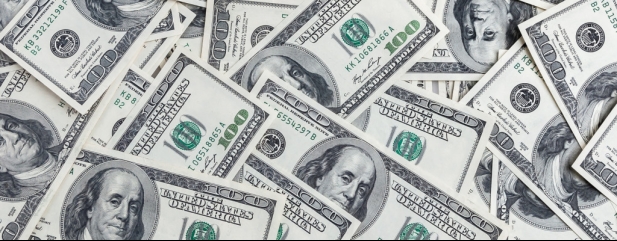Archived article
Please note that tax, investment, pension and ISA rules can change and the information and any views contained in this article may now be inaccurate.
Discover the UK stocks which are benefiting from the strong dollar

While US companies struggle with the impact of the strong dollar on their international revenues, FTSE 100 companies which have costs in sterling but record their sales in dollars should be quids in.
The dollar may have come back a bit recently but taken on a medium-term view its performance against other currencies has been remarkable.
And although most companies hedge their currency exposure each year in order to limit the impact of negative movements, a lot of finance directors will have looked at the outlook for this year and concluded that by not hedging their dollar exposure as much they could see a positive impact on profit.
As long as the Federal Reserve sticks to its gameplan of keeping interest rates higher for longer to try and stamp out inflation, there is little to stop the appreciation of the dollar against other world currencies.
So far the beneficiaries include food and household goods giant Unilever (ULVR), the third-largest stock in the FTSE 100 index, which posted third quarter results last week showing turnover grew by 17.8%, of which almost half (8.8%) came from favourable currency moves.
Chief executive Alain Jope raised the firm’s full year guidance for a second time, predicting underlying sales growth of 8% compared with ‘over 6.5%’ previously thanks to price rises and currencies.
Personal care group Reckitt (RKT), which also reported earnings last week, revealed that over half of its reported 14% sales growth for the third quarter was thanks to a tailwind from the strong dollar.
The firm said that if exchange rates stayed where they were at the end of September there would be a positive effect on sterling sales for the year of around 6% while earnings per share would get a 9% to 10% lift.
Surprisingly, Barclays (BARC) is also on the list of winners as it books between 40% and 45% of its income in dollars but only 30% of its costs, so its profit margin has been helped by the recent surge in the US currency.
Looking ahead, drinks group Diageo (DGE), which like Unilever and Reckitt counts the US and emerging markets – where sales are also typically accounted for in dollars – as its biggest regions, suffered a currency headwind in the year to June but will likely enjoy a boost to revenues and earnings after the rapid climb of the dollar since the summer.
Similarly, drugs group AstraZeneca (AZN), the second-biggest stock in the FTSE 100, is likely to have enjoyed a significant currency tailwind in the third quarter when it reports its latest earnings on 10 November.
Important information:
These articles are provided by Shares magazine which is published by AJ Bell Media, a part of AJ Bell. Shares is not written by AJ Bell.
Shares is provided for your general information and use and is not a personal recommendation to invest. It is not intended to be relied upon by you in making or not making any investment decisions. The investments referred to in these articles will not be suitable for all investors. If in doubt please seek appropriate independent financial advice.
Investors acting on the information in these articles do so at their own risk and AJ Bell Media and its staff do not accept liability for losses suffered by investors as a result of their investment decisions.
Issue contents
Editor's View
Feature
Great Ideas
News
- Investors turn wary eye to Marks & Spencer and Primark-owner
- US inflation remains sticky, but some there are signs it could be peaking
- Halfords investors rejoice as the retailer’s share price finally starts to recover
- Why shares in On The Beach remain down in the dumps
- RELX and CentralNic stand out in latest batch of earnings upgrades and downgrades
- Lula stages remarkable political comeback to lead Brazil for a third term
 magazine
magazine








